The Corne¬ Daily Sun





This year’s Slope Day lineup features artists with the third most star power in approximately two decades, according to American studies lecturer Corey Ryan Earle’s ’07 ranking of Billboard Hot 100 hits appearances.
Crowding on Libe Slope, students will enjoy performances by Flo Rida and A Boogie Wit a Hoodie on Wednesday, May 8.
To understand how this star-studded line-up came to be, The Sun interviewed Margot Baker ’25, executive director of the Slope Day Programming Board to get a behind-the-scenes look into the artist selection process.
Slope Day is organized by the University in coordination with the SDPB, a student-run organization. Created and funded by the Student Assembly, SDPB plans and organizes performances while the University handles the logistical aspect of Slope Day, including catering and budgeting.
Baker explained that this year’s artists were chosen based on two rounds of surveys completed by Cornell students and an assessment of SDPB’s allocated budget.
The first survey asked students to rank their preferred music genres and to name desired headliners. Rap, pop and electronic dance music were the most voted for, so students were then asked to rank specific potential artists within those genres in the second survey.
In previous years, SDPB only sent one survey asking students to rank artists, but this year, SDPB made the survey process more comprehensive to increase students’ ability to share direct input, according to Baker.
SDPB also reviewed logistical and administrative funds — including security measures
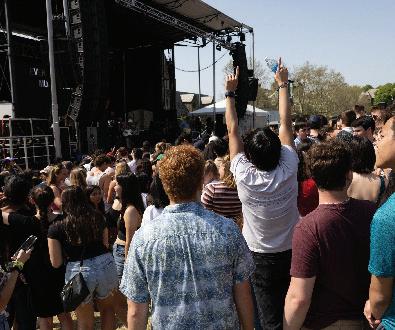

and recreational vehicle dressing rooms for performers — before allocating the rest to the talent budget.
For Slope Day 2024, the Student Assembly approved a $400,000 budget increase for SDPB, more than doubling the group’s funds from $315,000 to $715,000. The Assembly increased the SDPB budget due to a drastic price increase for talent after COVID-19 which left SDPB struggling to pay artists in high demand.
With this increase, SDPB was able to allocate $350,000 of the budget towards talent.
After survey results were taken, the artists selection and relations director selected performers to get price estimates from to determine realistic potential Slope Day lineups. As executive director, Baker had the final say in picking which artists SDPB sent offers to.
Baker said adding the first survey helped SDPB determine which artists to reach out to for a quote. However, she hopes that more students will respond to the survey in the future so results are more representative of the Cornell population.
Although all undergraduate students received both Slope Day surveys, not everyone filled it out. 4,818 students responded to the first survey and 7,302 responded to the second survey, which represents approximately 30 percent and 45 percent of the undergraduate student body, respectively.
Still, this is the greatest number of responses the Slope Day Programming Board has received in several years, according to Baker.
To continue reading this article, please visit www.cornellsun.com.
Shannon Lee can be reached at ssl243@cornell.edu.
A Cornell University Police Officer allegedly struck a 19-year-old Ithaca College student while driving while intoxicated, shortly after 1:30 a.m. on Saturday, May 4. The student sustained serious injuries from the incident, which occurred near the 1500 block of Slaterville Road near Tudor Park, according to a New York State Police statement. The student was medivacked to Guthrie Robert Packer Hospital in Sayre, Pennsylvania.

The officer was identified as Blake Curtis in the state police statement. Curtis has been charged with driving while intoxicated — a misdemeanor — and vehicular assault — a class E felony. The state police are conducting an ongoing investigation into the incident, according to the statement.
New York State Police was dispatched after Curtis called 9-1-1 “immediately” after the incident.
In a statement shared with The Sun, Lindsey Knewstub, deputy director for Cornell Media Relations, confirmed that Curtis is a CUPD officer and said he was off duty when the incident occurred and has been placed on administrative leave.
Kate Sanders can be reached at ksanders@cornellsun.com.
Benjamin Leynse can be reached at bleynse@cornellsun.com.
appy lope ay ve!
As per recent tradition, Slope Day will be held the day after classes end to celebrate the end of the academic year.
Free Breakfast
Free breakfast sandwiches and fruit will be served in front of Schwartz Center from 7:30 - 10:30 a.m.
Wristbands
If you have not already obtained your Slope Day wristband, you must pick one up today with a Cornell ID.
Music
Flo Rida will open the concert, followed by A Boogie Wit da Hoodie.
Weather
Expect rain and warm temperatures.
Pick Up Your Wristband
Willard Strait Hall Browsing Library: 11 a.m. - 10 p.m.
RPCC: Noon10 p.m.
Cornell students organized an anti-apartheid shantytown in 1985
By ANUSHKA SHOREWALA and MATTHEW KIVIAT Sun Assistant News Editor and Sun News EditorFrom the Willard Straight Hall takeover in 1969 during parents' weekend to the Latino Students’ takeover of Day Hall in 1993, civil disobedience has been an integral part of Cornell’s past.
On April 25, the Coalition for Mutual Liberation organized an encampment at Cornell on the Arts Quad with a list of eight demands for the University to consider, joining a nationwide movement of students organiz-
ing pro-Palestine encampment protests.
In 1985, students created a “shantytown” encampment to urge the University to invest in companies that conducted business in apartheid South Africa — the government-sanctioned racial segregation and discrimination against nonwhites. Throughout the 1960s, advocates began to call to divest from South Africa to protest against the country’s discriminatory practices. Although the movement began in the 1960s, it did not gain popular attraction until the 1980s, when universities across the country — includ-
ing Columbia University and the University of California, Los Angeles — started to stage protests to advocate for divestment against South Africa.
In April of 1985, students at Cornell organized a protest, setting up tents behind Day Hall in support of divestment from companies doing business in South Africa.
To continue reading this article, please visit www.cornellsun.
Anushka Shorewala can be reached at ashorewala@cornellsun.com. Matthew Kiviat can be reached at mkiviat@cornellsun.com









Two days into the pro-Palestine encampment on the Arts Quad, international graduate students Bianca Waked and Momodou Taal were suspended for their participation.
Now, Cornell Graduate Students United – United Electrical, Radio and Machine Workers of America is arguing that since the University failed to bargain with the union prior to adopting the Interim Expressive Activity Policy, the policy is illegal. Thus, the union is asserting, the suspensions themselves were illegal, as Waked and Taal were penalized under the interim policy.
Taal, Waked and two other students were charged on Friday, April 26 with the unauthorized use of University property by engaging in or facilitating outdoor camping on the Arts Quad without approval, failure to comply with University directives
to remove the unauthorized encampment, unreasonably loud chants and behavior, failure to disperse from the Arts Quad and staying past 8 p.m. on Thursday, April 25 — the initial deadline to leave given by administrators.
Taal and Waked are international students, meaning suspensions threaten their legal status in the country.
On Wednesday, Marguerite Pacheco grad, a member of the CGSU-UE Bargaining Committee, and Sadie SeddonStettler grad, a member of the CGSU-UE Contract Action Team, told The Sun that the University was required by law to negotiate over the interim policy with the union, since it constituted a change to working conditions as it is being used to discipline graduate students. The collective bargaining process includes the University’s bargaining committee and CGSU-UE’s elected Bargaining Committee.
The union was established
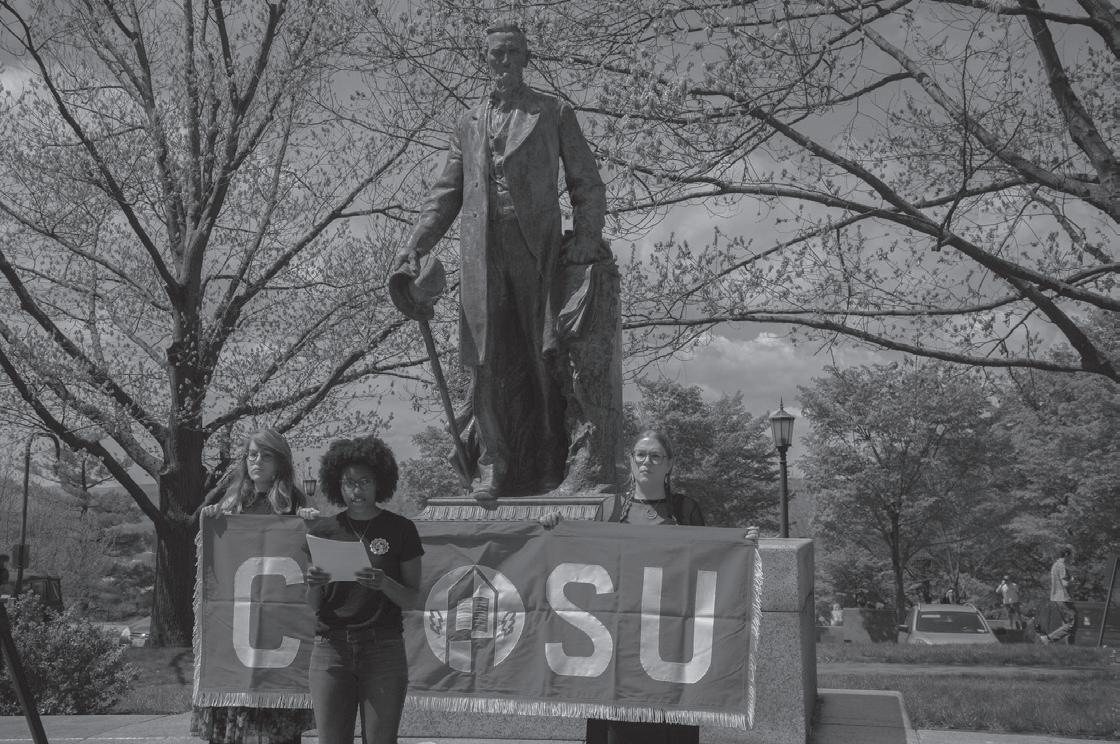

in November to represent graduate workers across the University after an overwhelmingly positive 1,873 to 80 vote in the unionization election. This vote predated the initiation of the controversial interim policy in January. Under the National Labor Relations Act, employers cannot change wages, hours, working conditions or other mandatory subjects of bargaining without bargaining with the union to a point of agreement or overall impasse.
“Cornell can’t just make a new law, some new rule by which now it’s illegal to do this and all these grad[uate] workers are now non-compliant and we get rid of them — that’s the legal idea there,” Pacheco said.
At a CGSU-UE press conference held on the Arts Quad at 1 p.m. on Wednesday, Jawaunna McAllister grad, a member of the CGSU-UE Bargaining Committee, said that the union demanded to bargain over the interim policy over a month ago. But instead of bargaining, the administration “decided to proceed full steam ahead” with the policy, McAllister said.
McAllister also described that the Math Department banned personal display items — including flags and personal decorations — from graduate student offices in February, without bargaining with the union.
To continue reading this story, please visit www.cornellsun.com.
President Martha Pollack accepted a Student Assembly resolution to raise the student activity fee from $310 to $424 — representing a 37 percent increase — according to the April 29 S.A. newsletter.
But with the administration stipulating on an incremental increase over the next two years, the $384 price tag for the 20242025 school year does not bring enough funding to cover all expenses initially slated by the S.A. budget in Resolution 39.
Byline organizations are consequently seeing their funding reallocated for the upcoming 2024-2025 school year.
The Student Activity Fee is a mandatory payment for Cornell undergraduate students that funds many campus organizations and activities. It is recalculated every two years to reassess ever-shifting funding needs.
The Student Activities Funding Commission allocates the collective funding to 30 byline organizations, which support 700+ groups on campus. Byline organizations are groups that are registered as umbrella organizations that fund various groups on campus, for example, the Multicultural Community Fueled Activities Board and Environmental Collaborative.
According to then-Vice President of Finance Zora deRham ‘27, the Student Activity Fee for the 2022-24 season was lower than usual due to organizations’ rollover funding from the 2020-22 season. The activity fee for the 2020-22 period was set before the COVID-19 pandemic, which resulted in campus groups accumulating unused funding since many did
not utilize their entire budgets amid campus restrictions.
Out of rollover funding, the fee for 2024-26 needed to be increased, according to deRham.
“For the 2024 to 2026 cycle, in order to maintain precedent for organizational funding and to … maintain the existing standards, a lot of organizations came to us asking for hefty increases [in the budget],” deRham said.
However, according to deRham, there were “internal issues” within the University related to the sharp increase of the fee that required the Student Activity Fee to increase over a span of two years rather than one.
“The costs are being cut because the increase to $424 was too steep and so we had to find a middle ground number for the next year,” deRham said.
deRham said she was “not allowed” to divulge more context on the issues surrounding these issues.
While increasing the fee over two years may ease the transition, it also creates a gap in byline funding. The S.A. budget presented in Resolution 39 declared that $424 per student is needed to support the various byline organizations — including the Slope Day Programming Board, the Cornell Sports Council and Haven: The LGBTQ+ Student Union.
To continue reading this story, please visit www.cornellsun.com.
France-Miller can be reached at dfrancemiller@cornellsun.com.
www.cornellsun.com
Responding to months of controversy in the Student Assembly and ongoing tension on campus, outgoing S.A. President Patrick Kuehl ’24 introduced a resolution that aims to increase transparency and implement anti-bias training, among other initiatives. The resolution passed unanimously on Thursday, May 2.
The resolution mandates anti-bias and transparency training for all members of the Assembly, focusing on steps to recognize implicit bias, increase relationships with individuals and groups in the Cornell community and educate about the proper methods to report bias and harassment.
The resolution also calls for funds to be allocated toward implementing date-rape-drug test kits in and around Cornell’s campus in the Fall 2024 semester.
This resolution comes after a Sun investigation into the conduct of a then-high-ranking Assembly member revealed that he demonstrated a pattern of blocking women’s health-related resolutions, including a proposal to implement date-rape-drug test kits at fraternities and Cornell Health.
Proposed by presidential candidate Pedro Da Silveira ’25 in April 2023 to then-Interfraternity Council president and vice presidential candidate George Rocco DeLorenzo ’24, Da Silveira
asked if he could campaign on providing free date-rape-drug test kits to fraternities to “maintain an ‘extra safe fun environment’ (you know to really sell myself to the women vote),” an April 21, 2023, message read. The two had an apparent agreement to bar discussion of Greek life from the Student Assembly.
In response, DeLorenzo — who went on to become the vice president of finance of the S.A. before resigning last month due to the findings of an internal ethics investigation — said campus focus was no longer on date rape at fraternities, as it had been in November 2022 after a series of drugging incidents and a sexual assault were reported at Cornell fraternities. “Bringing it back out now does not seem like the best idea,” DeLorenzo wrote, adding that he was not confident test strips work effectively.
When further pressed if Da Silveira could simply campaign on providing funds for Cornell Health to distribute date-rape-drug test kits without mentioning fraternities, DeLorenzo wrote to “pls stay away from this type of stuff.” He added: “There are other ways to get the female vote and this method is thinly veiled at best.” Da Silveira went on to win the presidency, but was ousted when it was publicly revealed he had a Title IX allegation against him. He was later found not responsible for sexual assault by the Title IX Office.
An investigation by the S.A. Office of Ethics found that DeLorenzo, as chair of the Appropriations Committee, acted in a manner that led to a hostile working environment for committee members and various student organizations that receive funding from the committee.
“There will be a need for people to have the resources to work through issues together.”
Patrick Kuehl ’24
Members from the Gender Justice Advocacy Coalition testified that they “felt uncomfortable during Appropriations Committee meetings, due at least in part to DeLorenzo’s alleged belittling comments toward female presenters and occasionally aggressive demeanor.” In November, DeLorenzo recommended a decrease in funding for GJAC due to a lack of clear financial records, though the ethics investigation did not find evidence of bias in DeLorenzo’s allocation of funds.
Kuehl told The Sun that while this resolution was not created in direct response to the action of DeLorenzo, it is in response to “vast inequities” that have been brought to light in the last year.
With the passing of Thursday’s
resolution, all student organizations that receive funding from the Appropriations Committee will also be granted an ex-officio seat on the Assembly, which Kuehl said is an attempt to facilitate direct communication between organizations and the S.A. outside of advocating for funding.
The resolution further establishes a Campus Pulse Committee, supported by an endowed account with $400,000, to increase the availability of resources to address the “pressing needs” of the campus community. The committee will implement anti-bias programming and work to facilitate community conversations designed to increase “empathy and cross-cultural dialogue between individuals and groups on the Cornell Campus.” Included on the committee will be the president of GJAC, or their designee.
“The challenges we have seen this year, both inside the Assembly and in the campus community, while unique to this year, certainly won’t be the last challenge that we face as a community,” Kuehl said. “There will be a need for people to have the resources to work through issues together.”
To continue reading this story, please visit www.cornellsun.com.
Located on an 80-acre plot of farmland, the Ithaca Waldorf School takes a non-traditional approach to a student’s education. Students undergo a handson learning process that utilizes the farm to teach students both academic and practical skills.
The IWS is part of an international network consisting of over 250 schools across the globe.
Though some Waldorf Schools span all grades, the IWS instructs students from preschool through eighth grade.
In 1919, the Waldorf method of education was developed by philosopher Rudolf Steiner in
Germany to serve the children of workers in the Waldorf Astoria cigarette factory and to challenge the traditional educational complex. The IWS has distanced itself from Steiner over his controversial views on race, stating on its website that the school “unequivocally denounce[s] any statements made by Rudolf Steiner that do not honor all human dignity.”
Laura Hayes, director of the IWS, explained the Waldorf method emphasizes intrinsic motivation, forgoing a traditional grading system. The school uses progress reports instead of letter grades.
“[Intrinsic motivation] makes [students] really want to engage
with the content versus having to learn just for a test,” Hales said.
“It’s like learning to learn instead of learning for a grade or your GPA.”
Hayes also said that the school deliberately omits technology and traditional textbooks from classrooms, opting to have students create their own “lesson books” instead.
“[There are] no screens, no phones, no nothing,” Hayes said. “It’s all handwritten textbooks that they make themselves. So [when students] have an experience, they conceptualize it [and] they write it down into their main lesson book, … which creates really beautiful ways of showing what they’ve learned

over the year.”
Students also dedicate much of their days outside on the school’s farm to gain hands-on educational experiences, Hayes said.
Hayes explained that the school offers two classes of farm and land stewardship. Only middle school students currently do farm chores in the morning, but the school aims to eventually have every grade level participate in farm chores in the coming years.
Melanie Ryan, a fourth and fifth-grade teacher at the school, said she incorporates agricultural principles into teaching academic skills, such as fractions.
“One of the activities that my class did was they designed farms and we broke [the farm] into fractions,” Ryan said. “[For example], half of your farm is grain production, or a quarter of your farm is pumpkins or squash.”
Ryan said that some of her favorite lessons to instruct involve students learning about the production of food and being able to eat the food that they grew at the end.
“I think it’s really good when [students] know where [their food] came from,” Ryan said. “ If they had a hand in growing it, they’re far more likely to eat it even if it’s like kale. Using some of the herbs and edibles that we grow, they can even make their own teas and different things like that.”
To teach second and third graders measurements, Ryan said students participated in the 2024 Downtown Ithaca Chili Cook-
off, combining their knowledge of math with their knowledge of food production. Their maple chipotle venison chili placed third in meat-based chilis and won the People’s Choice Award.
“They learned about volumes and weights,” Ryan said. “[With their new understanding of math], they learned how to cook a huge 20 gallons of chili for the chili fest.”
At IWS, unfavorable weather does not keep students off the farm. Students have gear to take on the rain and snow, including boots, rain jackets and rain pants.
Ryan said that students go outside to work on the farm throughout the winter, barring extreme cold.
“[During winter time] we go outside,” Ryan said. “If the wind chill is below negative 20, we stay inside, which I can say did not happen once this winter. So we were outside the whole time.”
Netta Joachims, an eighth grader at the Waldorf School, has an active role in the upkeep of the farm. Joachims takes care of the cows, ensuring they have water and food.
Joachims’ Eighth Grade Project, titled “My Study of Cows,” involved halter breaking a calf to get it accustomed to people. Halter breaking trains the cow how to be handled using a halter.
To continue reading this story, please visit www.cornellsun.com.
Dalton Mullins can be reached at dmullins@cornellsun.com.
Jonathan Brand can be reached at jbrand@cornellsun.com.
There is an undeniable truth in the notion that acceptance increasingly hinges upon ideological alignment — a phenomenon I must, albeit reluctantly, admit to not being immune to. Indeed, I hold steadfast to my preferences: a proud liberal, champion for Uris over Olin, not at all a Swiftie and a firm believer in George Harrison reigning as the best Beatle. Nonetheless, I hesitate to brand myself as judgmental. Opinionated? Undeniably. Judgmental? While I may be an imperfect narrator of my own story, I believe I tread cautiously along that line.
Their subtle differences aside, the evolution of “opinion” and “judgment” in our societal discourse demands equal scrutiny. In an era marked by stark division, there exists a pressing need to interrogate how the operationalization of certain opinions can cloak the perpetuation of oppressive ideologies and catalyze them into action.
As winter break approached and I readied myself for a much-needed “brain break,” the headlines inundated my phone regarding the Alabama Supreme Court’s IVF ruling that an
embryo is a living child. At times, I question why I remain so vulnerable to the effects of such news; this act came as no surprise.
Anti-abortion legislation is not about abortion, and it never has been; it is about dominance, the continued relegation of the female body as a site for degradation and exploitation. The irony of the ruling is palpable, and the objective apparent — now, even wanted pregnancies face attack?
As a lover of language and its nuances, a proponent for effective communication and a staunch advocate for truth, few experiences are as sobering as witnessing baseless opinions, rooted in illiteracy and bigotry, infiltrate both the political and personal realms — now more than ever inextricably entwined.
When the Alabama Supreme Court ruled that frozen embryos are “considered” children, I scoffed. I consider Italian cuisine to be better than French, dogs to be better than cats. There exists a pronounced schism between subjective oppositions and objective tyranny. The “considerations” spurred by such judgments blur the indispensable demarcation
between the two, enabling blatant gender violence and obscuring clarity.
As instances like the recent IVF ruling become more prevalent and the rationales behind them increasingly rooted in theocracy, I discern a troubling pattern: the push to convert subjective beliefs into objective truths. Chief Justice Tom Parker’s recent declaration that “even before birth, all human beings bear the image of God, and their lives cannot be destroyed without effacing his glory,” not only undermines a fundamental tenet of democracy by intertwining Church and State but also functions to diminish female personhood.
We find ourselves at a harrowing juncture where vehement affirmations perpetuating a sexist ideology embed truth and trust in Christian nationalism, stripping women of their bodily autonomy — a tyrannically enforced deadlock where we’re forced into pregnancies we neither seek nor can sustain, and denied the ones we yearn for.
As the female body unwillingly continues to emerge as the battleground for ideological skirmishes, there exists scant space for
opinion or consideration — unless, of course, the opinions are those of the women themselves.
In succumbing to a narrow, and in this case, Christian-centric notion of personhood and subjectivity, we observe humanity buckle under the weight of a pervasive, opinionated hubris and unsubstantiated opinions exert unprecedented influence. Navigating these tumultuous waters requires a vigilance against the erosion of fundamental rights and the manipulation of subjective judgments for ulterior motives.
As a creative writer and advocate for subjectivity, I pen this piece fully aware of its departure from my usual stance: cherishing personal experience as evidence and nuance as a conduit to comprehensive understanding. Yet, paradoxically, where subjectivity once felt liberating, it now feels carceral, offering no escape except compliance with its mandates.
Nevertheless, it is essential to recognize that opinion and judgment aren’t inherently flawed; a world confined to the barren perspective of an objective, all-knowing truth denies the possibility of what
ASU Professor and retired Washington Post journalist Leonard Downie Jr. views as more “trustworthy” journalism.
Nothing about reproductive autonomy is up for rumination by those who are not enduring the pregnancy themselves. Whether someone of child-bearing ability bases their decision to have or not have an unborn child on financial circumstance, the grace of God or, you bet, just the blatant desire to have or not have a child in itself, the sole arbiter of the matter is the individual concerned.
In the wake of escalating anti-abortion legislation, or more aptly, an anti-woman agenda, I’ve wearily observed what has become glaringly apparent in the recent IVF ruling: subjectivity can precariously sway the course of justice. When entrusted to those who source power in control, subjectivity’s intended purpose to foster inclusivity and autonomy is instead co-opted to curtail freedom and eradicate choice altogether.
1. Paragon: “Harm - Live at Bailey Hall”
2. Paragon: “TwisterLive at Bailey Hall”
3. Doja Cat: “Say So”
4. Flo Rida: “Club Can’t Handle Me (feat. David Guetta)”
5. Flo Rida: “Right Round (feat. Ke$ha)”
6. Flo Rida: “My House”
7. Flo Rida: “Whistle”
8. Flo Rida: “Low (feat. T-Pain)”
9. A Boogie Wit da Hoodie: “Drowning (feat. Kodak Black)”
10. A Boogie Wit da Hoodie: “My Shit”
11. A Boogie Wit da Hoodie: “Jungle”
12. A Boogie Wit da Hoodie: “Look Back at It”
Eric Han is a sophomore in the College of Arts and Sciences. He can be reached at ehan@cornellsun.com.
‘Solar Flare’ is a weekly playlist column where Sun contributors spotlight a slice of musical taste with the campus community. It runs every Monday.

142nd Masthead
GABRIEL LEVIN 26
Editor in ChiefMAX FATTAL ’25
Associate Editor
HENRY SCHECHTER ’26
Opinion Editor
MARIAN CABALLO ’26
Multimedia Editor
NINA DAVIS ’26
Photography Editor
ERIC HAN ’26
Arts & Culture Editor
SYDNEY LEVINTON ’27
Arts & Culture Editor
JADE DUBUCHE ’27
Social Media Editor
DANIELA ROJAS ’25
Lifestyle Editor
ISABELLE JUNG ’26
Graphics Editor
JOLIN LI ’27
Layout Editor
PARIS CHAKRAVARTY ’27
Layout Editor
CYNTHIA TSENG ’27
Assistant Photography Editor
LUCY CAO ’26
Assistant Photography Editor
ALLISON HECHT ’26
Newsletter Editor
JULIA SENZON ’26
Managing Editor
ERIC REILLY ’25
Assistant Managing Editor
MARISA CEFOLA ’26
News Editor
MATTHEW KIVIAT ’27
News Editor
CHRISTINA MacCORKLE ’26
News Editor
KATE SANDERS ’27
News Editor
JANE McNALLY ’26
Sports Editor
GABRIEL MUÑOZ ’26
City Editor
KAITLIN CHUNG ’26
Science Editor
LAINE HAVENS ’25
Science Editor
ANUSHKA SHOREWALA ’26
Assistant News Editor
DINA SHLUFMAN ’27
Assistant News Editor
HAMNA WASEEM ’27
Assistant Sports Editor
NICOLE COLLINS ’25
Weather Editor
Joseph Margulies is a Professor of Government. He can be reached at jm347@cornell.edu.
Winter is tenacious in upstate New York. It endures far longer than it should, and brings with it a darkness that makes you bury your head and pray for spring. I thought of our long, dark winter when the editors of The Sun asked if I would jot a few lines about the encampment on the Arts Quad. And I thought about Emerson, who spoke at Boston’s Masonic Temple in 1841, and whose remarks I have edited for space:
The two parties which divide the state are very old, and have disputed the possession of the world ever since it was made. Conservatism is always apologizing, pleading a necessity; it must saddle itself with the mountainous load of the violence and vice of society, must deny the possibility of good, deny ideas, and suspect and stone the prophet; whilst innovation is always in the right, triumphant, attacking, and sure of final success. Conservatism stands on man’s confessed limitations; reform on his indisputable infinitude. We are reformers in spring and summer; in autumn and winter, we stand by the old.
Some of our students have seized the spring. Most of their demands insist only that Cornell make good on its promise: Divest, as years ago it vowed it would. In another spring, Cornell pledged it would divest from morally loathsome practices to protect “the goals and principles of the University.” In this, our winter, it apparently cannot recall what those goals and principles are. Acknowledge and atone, as history demands you must. It is ironic to condemn students as trespassers on stolen land. Disclose, as ethical governance requires. A university that claims it cannot know or control its money deserves to have none. Teach, so that “any person can find instruction in any study.” Absolve, because we ought not punish people who alert us to the suffering of others, simply because they
Max Fattal is a third year in the School of Industrial Labor Relations and the associate editor of Te Cornell Daily Sun. Tey can be reached at mfattal@cornellsun.com.
It feels… peaceful. Not in the sense of peaceful protest or the principles of nonviolence. It’s peaceful in that those overwhelming, vomit-inducing, perhaps unfixably terrifying problems of the world have shut up for five minutes. They’ve shut up in precisely the place where students are chanting about them and painting signs. It’s where the whole national media apparatus has decided to center their latest campaign of needless fear-mongering, and it feels peaceful. I can’t help but hyperbolize: The encampment is magical.
I rarely get emotional while editing, but I found Prof. Rickford’s recent submission deeply moving: The encampment is “utopian in the sense that the terms of living that it demands are impossible under existing conditions.” He put it better than I could. But on an affective level, utopia is more than the aspirational call for revolution. For me, the encampment feels like utopia in that it reminds us of the possibility of a better world. By capturing a sliver of the Arts Quad and starting from scratch, the campers remind us that there is always another way — that there can be a better way.
the once universities of Gaza; they have all been destroyed. I do not begrudge anyone who is unable to cynically see past the willingness of millions to endorse brutality rather than address genocide. For my part, though, I’ve never felt more confident. This isn’t the story of the evils of capitalist imperialism — that’s the story we’ve heard for the last month, last year, last decade. Today, the story is the rejection: Activists are opting out of that whole damn thing — this is what’s new and this is what matters.
I know my presence in the encampment is a source of occasional anxiety. That is to say, I know I represent The Sun — an institution, an ossified institution. I can, should and must engage with counter-protestors, dissenters to the mission. My job description (reflection of the whole University in the pages of The Sun) will necessarily include voices against the encampment — sometimes strongly so. I am inextricable both from my personal identity as a leftist and my journalistic identity as the representative of a centrist, neoliberal organization.
have also roused us from slumber.
In spring, Cornell is a reformer. It cheers the limitless potential of the human spirit and begs its students to dream. But it is not yet spring in Day Hall. The University pillories harmless students who sleep on the lawn, suspending some and threatening the rest. All are resolutely, insistently peaceful, and none blocks any passage. The University pleads necessity. ‘Ah, but you did not tell us you would have tents. There are rules governing this sort of thing, and you have broken the rules.’ In spring, we ask what is right; in winter, we ask whether the rules were followed.
The most that can be said of the administration’s response is that it has not made matters much worse by needlessly summoning the police to clear the quad. But while this might distinguish it from its heavy-handed peers, a university should not get too much credit for doing what is universally recommended by policing experts and practitioners, which is to exercise restraint.
Rather than embracing “the possibility of good” in the students’ demands by enlarging the circle of human compassion, the University stands mute. In its conspicuous and shameful silence, in its derision of its own students, in its capitulation to extremism from without, Cornell allies itself “with the mountainous load of the violence and vice of society.” As it attacks the students who dare to make good on the education we provided, it diminishes itself.
One day, spring will return to Day Hall. One day, Cornell will publish glossy brochures and hold expensive symposia that honor what these students have done. A future administration will invite them back to campus. They will gather where the tents once stood, speak with microphones that today are disallowed and praise the courage and moral clarity of those they now scorn. One day, when it is easy and safe, the University will again claim the mantle of reform.
But today is not that day.
I don’t think of myself as naive. In fact, I’ve been recently overwhelmed by startling and increasing recognitions of human fallibility. A few weeks ago I wrote in my notes app that my breakup had made it impossible for me to become an anarchist: for anarchy you need to believe in people and you do…and then the person you believed in more than anyone else in the world loses your faith. Within the encampment I’ve tried to pay close attention to those limitations: escaping, for a moment, the crushing weight of the neoliberal university can only solve so much. The campers, braver than me, remain human. The cracks of sleep deprivation and the weariness of cold, rainy weather begin to reveal themselves as days go on. I can only imagine that in a week or two further niceties will fall away simply as a result of the prolonged difficult conditions. They don’t, and won’t ever always agree on anything — there is no one agreed process of liberation, personalities inevitably run up against each other and along some of the faultlines, disagreements manifest in demoralizing anger. But the tents stay up and the demands continue: They do not stop themselves.
Around the world, we’re undoubtedly within a horrifying mask-off moment — if such a moment remains possible in an extended period of absolute institutional failure. Our newsfeeds are flooded with scenes of universities across the country who have invited violence against their own students, set against profound absence: We no longer see images from
It’s uncomfortable to feel tepidly unwanted, but there’s another form of rejection that I find all the more encouraging. Just like the administrators and officers, the press can be made to feel obsolete. At the end of the day, the campers retain their own story — and the right to tell it. No institutions need exist in the encampment; no vestige of the world outside need participate; no one — not Martha Pollack, not The Sun, not the CUPD— holds an ounce of power in that one corner of the Arts Quad.
And so the institutions have lost their meaning. The campers recognize that the only thing holding our sham social contract together is their willingness to abide by it: watching genocide unfold, they have stopped abiding. At Columbia, it took the strongest police force in the world, equipped with their military-grade suppression system to get the students off the quad — and if you think that’s going to stop the protests, I have a bridge to sell you. Students are sending the same message they’ve received from administrations for decades — nothing you can do to stop us matters. Tens of thousands across the country have stared down suspension, job loss or arrest without visible fear.
So, what does it mean when the administration’s gravest threats can no longer serve as a deterrent? What does it mean when people fully, truly, practically believe that together they have an unshakable strength? What does it mean when we act on the realization that our institutions need us more than we need them?
I suppose it means hope. I hope it means hope.
I write to offer an important correction to what was stated in a guest column by Nick Wilson on May 2.
A student on temporary suspension approached West Campus House staff at approximately 6:40 p.m. on Wednesday expressing concerns about their ID card access. Staff immediately provided the student a temporary ID card to ensure continued access to their housing and dining privileges and assured them that this ID card would work until move-out if their original ID was not fixed.
No student on temporary suspension in connection with the unauthorized encampment on the Arts Quad has been informed by the University that they have been evicted or must vacate university housing this term. Any assumption otherwise is incorrect. Students on temporary suspension who are living on campus continue to have access to housing, dining and student health services. Students on temporary suspension who live off campus have continued access to student health services.
Joel M. Malina, Vice President for University Relations

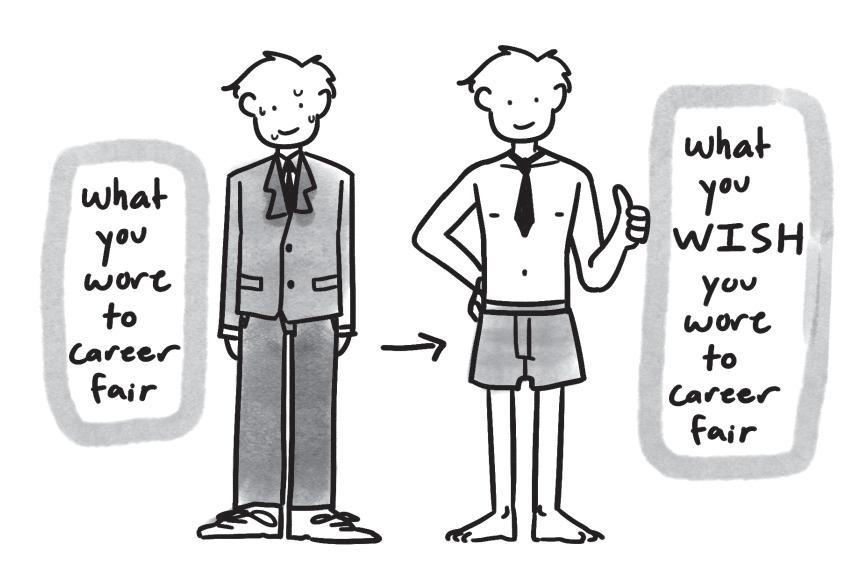
Fill in the empty cells, one number in each, so that each column, row, and region contains the numbers 1-9 exactly once. Each number in the solution therefore occurs only once in each of the three “directions,” hence the “single numbers” implied by the puzzle’s name. (Rules from wikipedia.org/ wiki/Sudoku)

CLASSIFIED AD RATES
Ads are accepted at The Sun’s office at 139 W. State Street downtown, by phone or e-mail.
Deadline: 2:30 p.m. at The Sun’s office on the day preceding publication.
Standard Rate: $3.95 per day for first 15 words, 39 cents per day per word thereafter. Five or more consecutive insertions, $3.70 perday for first 15 words, 37 cents per day per word thereafter.
Commercial Rate: $5.95 per day for first 15 words, 40 cents per day per word thereafter. Five or more consecutive insertions, $5.75 per day for first 15 words, 38 cents per day per word thereafter.
The Sun is responsible for only one day makegood on ads.
273-3606 classifieds@cornellsun.com
cenro l usl n . c o m
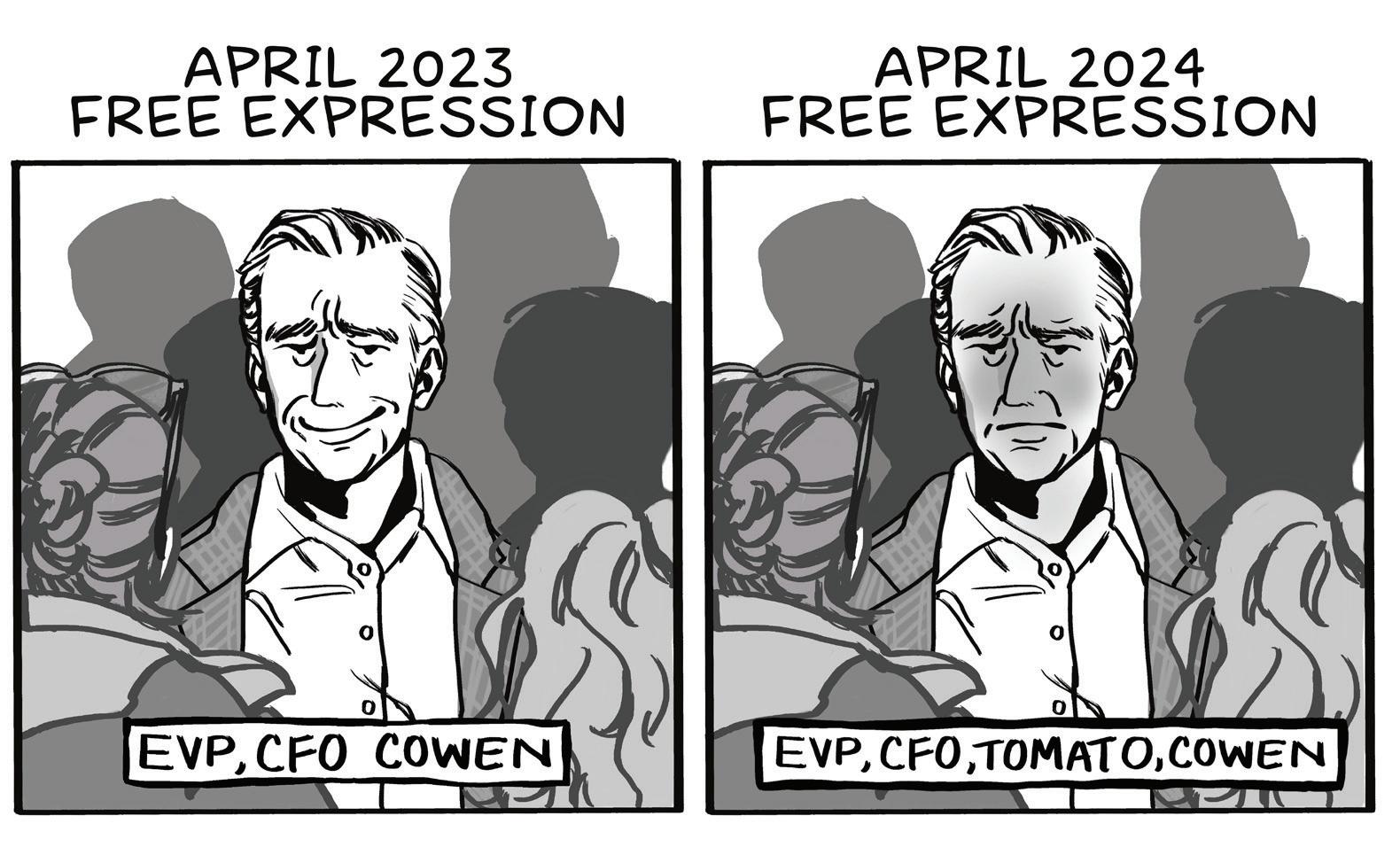

There is no better embodiment of Cornell Hockey than senior forward Izzy Daniel, the first Cornellian to win the Patty Kazmaier Award. Daniel is not just a product of the program, but also a builder who led the team out of the COVID-19 pandemic and back to NCAA title contention.
Along the way, she endeared herself to her teammates both on and off the ice through her personality, confidence and humility. Five years removed from her arrival in Ithaca, Daniel departs as one of the best women’s hockey players to ever don the Carnelian and White.
Daniel came to East Hill from The Blake School in Minneapolis, Minnesota, where she won two state championships and earned all-state honors two years in a row across four years of varsity hockey.
Her reasoning for coming to Cornell was ultimately the people.
“It was a tough decision, but it really came down to my visit at Cornell and the people I met here,” Daniel said. “Obviously, the campus was beautiful, but it was more so the people and the culture.”
Daniel’s initial attraction to the people that make up the women’s hockey program would be proven right time and time again over her four years on campus.
“I knew that she was going to do amazing things at Cornell from the second that she got there,” said Jaime Bourbonnais ’20, a former teammate of Daniel’s turned Olympian and Professional Women’s Hockey League player.
When Daniel arrived on campus in the fall of 2019, she joined a team that had made the Frozen Four the previous spring for the first time since 2012. She had an immediate impact. Daniel finished the season with 17 points and was seventh on the team in assists with 14. She was a key presence on an impressive power play, often playing with future PWHLers such as Kristin
O’Neill ’20, Micah Zandee-Hart ’20 and Bourbonnais.
“She really just fit in so well with the speed of the game right from the first time she put on the jersey, which is pretty remarkable,” Bourbonnais said.
But Daniel’s impact reached far behind the sheet of ice.
“Between Micah, Jamie Bourbonnais and I, I think we kind of all took Izzy under our wings in a sense,” O’Neill said. “In our senior year, she really looked up to all three of us and I think that relationship was super special,” O’Neill said.
The feelings were mutual.
“I was really lucky to have such great leadership my first year, and everyone on that team kind of showed me the way of what it means to be a part of this program,” Daniel said.
Daniel learned well, and she learned fast.
“She had an impact on our team on and off the ice, as soon as she stepped foot on campus,” Bourbonnais said. “Obviously she’s such an incredible player, but she’s such a great person and she brought the team really close together.”
Daniel’s freshman season was cut short by the COVID-19 pandemic. Cornell, which was ranked No. 1 in the nation and the top overall seed for the NCAA tournament, was robbed of a chance to win its first national championship.
The pandemic and the ensuing cancellation of the 2020-21 season, Daniel’s sophomore year, would mark a personal turning point for Daniel.
“When we learned we weren’t playing, I chose to go back home to Minnesota instead of staying enrolled at Cornell,” Daniel said.
To continue reading this article, please visit www.cornellsun.com.
Eli Fastif can be reached at efastif@cornellsun.com.
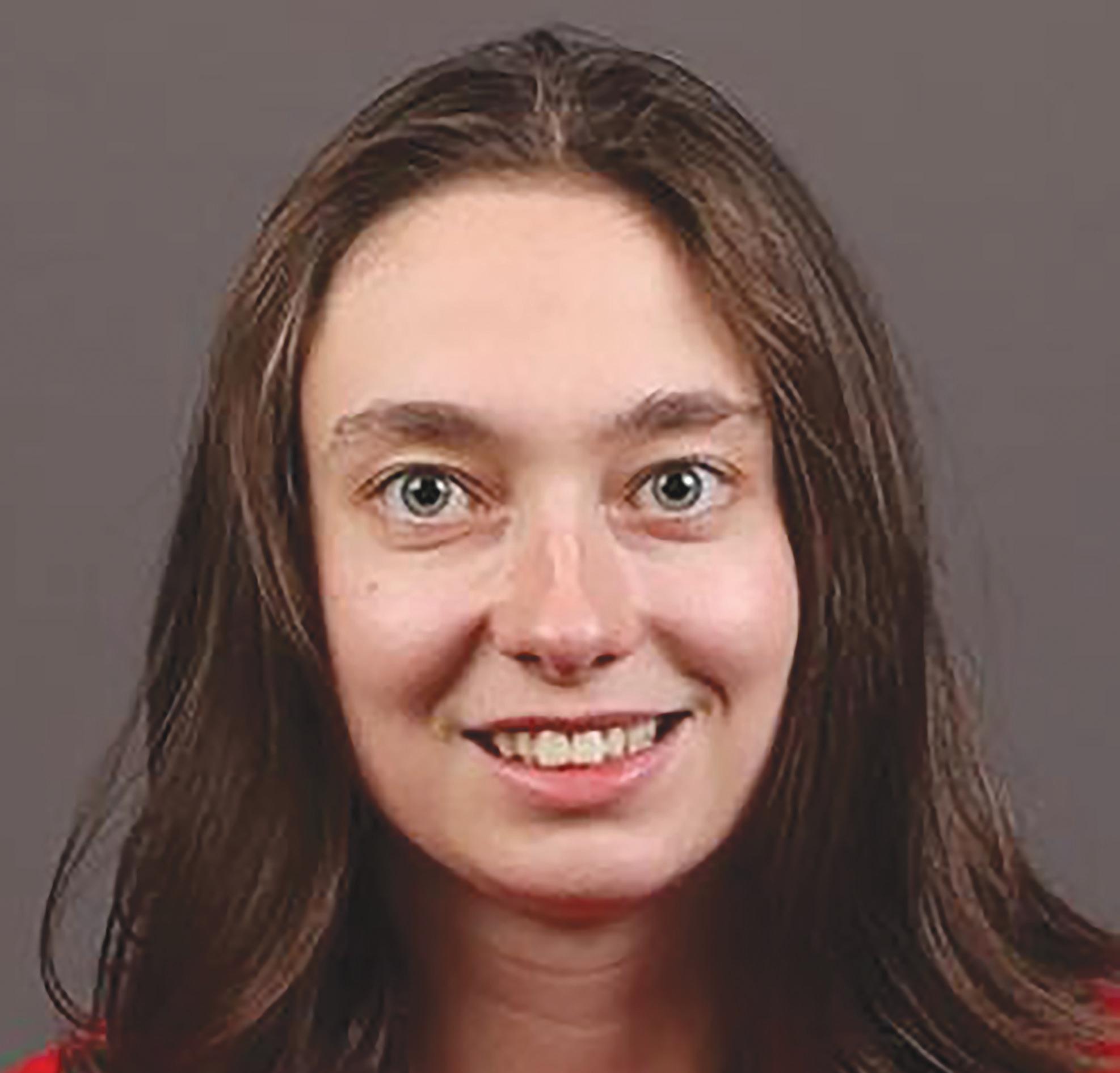

Arujau was able to improve quickly.
Following in the footsteps of Yianni Diakomihalis ’23 — one of the greatest wrestlers Cornell has ever seen — is a tall task, but senior Vito Arujau not only rose to the challenge but fully embraced it. As a four-time All-American, two-time NCAA champion and a world champion, Arujau stands as one of the most decorated Cornell athletes ever.
Vito’s dad, Vougar Arujau, wrestled for the Soviet Union and was a two-time world champion. Vito’s older brother, Nick Arujau ’15, followed their father’s legacy by wrestling for the Red from 2011-13.
Hailing from Syosset, New York, Arujau said wrestling was “in the family business.” He grew up around his father’s wrestling gym in Long Island.
“[As] I grew up, we didn’t have a babysitter, so my dad would just bring me to wrestling practice and sit me on the side,” Arujau said.
While he spent his days around the gym, Arujau did not dabble in wrestling himself until fifth grade.
“When I first started out, I was terrible,” Arujau said. “It’s not uncommon for you to start your kid in wrestling at the age of four, so by the time I started in fifth grade … [other] kids have had six years of experience.”
However, with the support and guidance of his father — who emphasized perfecting fundamentals —
“And then I kind of turned it into my own style and focused on the things I was good at,” Arujau said. “A lot of it was just getting my ass kicked until I figured it out.”
And “figure it out” he did, clinching four state titles while wrestling at Syosset High School and concluding his high school career with 173 consecutive wins. He won the United World Wrestling Cadet National freestyle title in 2017, earning a
“It’s unfathomable at times how good he is.”
Mike Grey ’11
silver medal at the Cadet World Games, and also earned a spot on the Junior World Team in the spring of 2018. While Arujau saw offers pour in from several renowned wrestling programs, his decision to join Cornell was a “no-brainer,” due to its mix of athletic and educational opportunities. He was also inspired by his brother competing for the Red.
“Cornell has the best networking and would do the most for me in the long run,” Arujau said. “You get one of the best wrestling programs in the world, but also one of the best educations.”
Arujau finished his freshman year by taking fourth at the 2019 NCAA Championships, earning
first All-America honor and securing Ivy League Rookie of the Year and a spot in the All-Ivy first-team. These accolades are nothing to balk at, but Arujau said his performance was “a little bumpy freshman year.” He wouldn’t be completely satisfied with anything but that National Champion title.
But Arujau’s ambitions were put on stand-still when the COVID-19 pandemic hit and the 2020-21 season was canceled.
Taking two years off from college wrestling, Arujau said the pandemic “threw [him] for a loop.”
When he returned for the 2021-22 season, he finished third at the NCAA Championships to claim his second All-American citation.
“I thought I had made a lot of improvements but took third at the tournament,” Arujau said. “It didn’t turn out to be the improvement I thought it was.”
Arujau’s junior year was a different story, as he claimed his first NCAA title with a 10-4 victory in the finals over two-time champion Roman BravoYoung of Penn State and was named the Most Outstanding Wrestler at the championships.
To continue reading this article, please visit www.cornellsun.com.
Hamna Waseem can be reached at hwaseem@cornellsun.com.